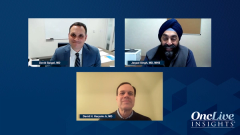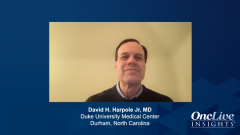
Multidisciplinary Care in Non-Small Cell Lung Cancer
A panel of experts introduce themselves and explain their approaches to multidisciplinary care in treating non-small cell lung cancer.
Episodes in this series

Transcript:
David Spigel, MD: Hello, I’m Dr David Spigel, a thoracic medical oncologist and the chief scientific officer at Sarah Cannon Research Institute in Nashville, Tennessee. It is my privilege to be joined by 2 great colleagues to discuss recent advances in the management of early stage non–small cell lung cancer. There’s been a lot going on, certainly a lot of breakthroughs in the last year that involve not just medical oncology obviously, but surgical and radiation oncology as well.
We have some cases we’re going to go through over the next 45 minutes or so that I hope highlight some of these recent advances, but maybe even more importantly, some of the challenges we still face as these new breakthroughs come into play and how we incorporate this into standards of care, and of course, what the next big questions will be. Before we dive into the cases, I’ll start with some introductions of my colleagues and let them introduce themselves. We’ll start with Dr Singh.
Jaspal Singh, MD, MHS: Hi. Thank you so much. I’m Dr Jaspal Singh. I’m a pulmonologist in Charlotte, North Carolina, at Atrium Health and Levine Cancer Institute. I’m a clinical professor at Wake Forest School of Medicine, where I’m a pulmonologist. My job is to tee people up for the rest of the oncology team to move quickly, expeditiously, and safely with the best chances for cures.
David Spigel, MD: Great. Thanks, Dr Singh. Dr Harpole?
David H. Harpole Jr, MD: Hi, I am Dr David Harpole. I’m a professor of surgery and pathology at Duke [University Medical Center, Durham, North Carolina] and one of the directors of our thoracic oncology program.
David Spigel, MD: Great. Thanks, Dr Harpole. I’ve had the chance to do several multidisciplinary education events with Dr Harpole. I think, Dr Singh, you and I may have worked together before too, but I look forward to this conversation. I would bet our conversation over the next 40 minutes or so is not unlike what happens for the 3 of us every day. In my case, I’m on the phone or texting my interventional pulmonology colleagues and radiation and surgical oncology colleagues almost every day about patient care. I’m sure that’s the same for you when you interact with your medical oncology colleagues. I think lung cancer always has been the best example of multidisciplinary care in terms of how you incorporate new advances as they occur.
I thought it might be best if we do these cases together, not just reserve it for pulmonary or surgery, and we’ll demonstrate how each of the disciplines gets involved in care. We have a couple of cases here. [There may even be] time to discuss some other things that come up.
Transcript edited for clarity.





































